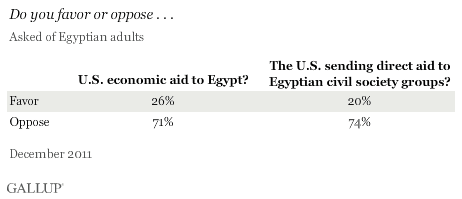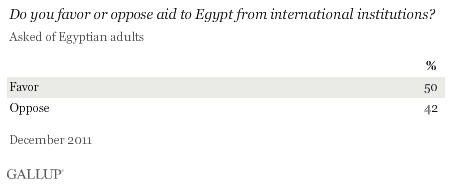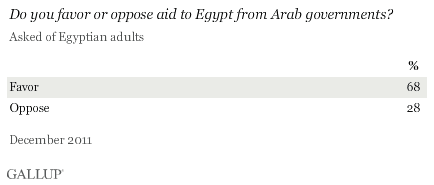LOS ANGELES -- About 7 in 10 Egyptians surveyed by Gallup in December 2011 oppose U.S. economic aid to Egypt, and a similar percentage opposes the U.S. sending direct aid to civil society groups. This rebuke of U.S. financial support may be a challenge for Egypt's newly elected parliament and its future president as the government attempts to bolster the nation's financial stability.

Political and economic turmoil has characterized the first year in Egypt after the fall of former President Hosni Mubarak. This instability has increased unemployment in Egypt, widened its budget and balance of payment deficits, and drained its foreign reserves.
Senior U.S. officials announced in January at the World Economic Forum in Davos, Switzerland, that President Barack Obama plans to speed up aid to Egypt as the nation transitions from the Mubarak era. Congress already approved $1.3 billion in military aid and $250 million in economic aid for the current fiscal year. Some of the conditions attached to this aid, including that it may not be spent unless Egypt meets all obligations under the 1979 Israel-Egypt peace treaty, may help explain its unpopularity in certain Egyptian circles. Some Egyptian activists say such restrictions encroach upon Egypt's sovereignty.
Egyptians are much more willing to receive aid from international institutions, with 50% favoring this type of help. Egypt's military and political leaders initally rejected an offer of support from the International Monetary Fund (IMF) but later changed their minds. Last month, Masood Ahmed, Director for the Middle East and Central Asia Department for the IMF, was in Egypt to discuss a potential $3.2 billion IMF loan to Egypt. Egyptian leaders' ability to attract foreign aid and investment will be important to collecting the capital needed to move the nation's economy forward.

Egytians are nearly as likely to favor aid from Arab governments as they are to oppose help from the U.S. Almost 7 in 10 favor aid from Arab governments.This may in part reflect high-profile announcements by several of the country's Arab neighbors about their involvement in projects to help rebuild Egypt's economy.

However, some Egyptian politicians have begun to voice concerns about collecting on their neighbors' promises. Fayza Abouelnaga, Minister of Planning and International Cooperation in Egypt, recently noted that her country had received only $500 million of the $3.7 billion promised by Saudi Arabia and $500 million of the $1.5 billion pledged by Qatar. Further, she said the United Arab Emirates has paid none of its promised $3 billion. Abouelnaga estimated in December that Egypt's foreign debt reached $34.4 billion, representing 15% of its gross domestic product (GDP).
Implications
As Egypt's new parliament begins its work and the country's citizens prepare for presidential elections, many Egyptians are suffering from the day-to-day realities of unemployment and price inflation. According to Gallup's most recent survey in December 2011, Egyptians are most likely to name inflation and lack of money as the biggest problem facing their families; the second is lack of jobs.
The new government's ability to fashion policies that will turn the economy around and give Egyptians hope will largely determine its success. The anniversary of the revolution passed without major violence -- an indicator of stability that some sources say reverberated positively in the Egyptian stock market. This is a hopeful sign for a nation struggling to negotiate the politics of international aid.
Financial aid can in some cases provide badly needed capital for economic empowerment and development, and ultimately help boost foreign investment and trade. With financial support from the U.S. deeply unpopular among the Egyptian people, the country's political and business leaders may be forced to focus on other aid sources. International organizations will play a significant role in the process of helping Egypt marshal resources and expertise for development in a way that the Egyptian public supports at this crucial stage in the country's transition.
Survey Methods
Results are based on face-to-face interviews with 1,077 adults, aged 15 and older, conducted Dec. 16-23, 2011, in Egypt. For results based on the total sample of national adults, one can say with 95% confidence that the maximum margin of sampling error is ±3.4 percentage points. The margin of error reflects the influence of data weighting. In addition to sampling error, question wording and practical difficulties in conducting surveys can introduce error or bias into the findings of public opinion polls.
For complete methodology and specific survey dates, please review Gallup's Country Data Set details.
Learn more about how the Gallup World Poll works.
